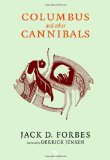When Thom Hartmann used the word “wétiko” in the movie I Am, it blew right past me the first couple of times I watched the movie. Then I watched the movie a third time so I could slow it down to understand the word and try to get the reference. He was describing it as a disease, and mentioned that the first person to talk about it that way was Jack Forbes.
In the book Columbus and Other Cannibals, Forbes calls the wétiko (cannibal) psychosis the greatest epidemic sickness known to mankind. He says that greed and gluttony, along with the cruel using of others’ lives without remorse is destructive of one’s own spiritual potential. He says that most Native languages have no word for “religion” and that a word for religion may not be needed until a people no longer have it.
Religion is, in reality, living. Our religion is not what we profess, or what we say, or what we proclaim; our religion is what we do, what we desire, what we seek, what we dream about, what we fantasize, what we think—all of these things—twenty-four hours a day. One’s religion, then, is one’s life, not merely the ideal life but the life as it is actually lived.
The last two chapters of the book talk about how to reverse the disease and how to find a path with heart. For the antidote to wétiko, Forbes turns to Siddhartha Gautama Buddha. The Buddha taught more than 2,500 years ago that we can break away from this suffering by following an individual path wherein we steer clear of dogmatism, sectarianism, greed, and organized religion in the normal sense. Forbes gives us a criteria to use to evaluate whether a path might be one we might want to follow.
So the real test of a spiritual path is not to see how many monuments result, or how many converts are obtained, or how many prayers are repeated over and over again by imitative voices, but rather the test is: How do people who follow that path behave? How do they behave towards other humans? How do they behave towards the earth? How do they behave towards other living creatures? Are they doing evil? Are they free men and women who will stand up to evil? Or are they passive foot-soldiers trained to surrender their minds and hearts to their masters?
For the month of February this year, we tried to practice the balance between humility and self-worth. The wétiko disease results in arrogance. The need to dominate others and the earth originate in feelings of unworthiness. The first time I read the book, I only remembered the part about arrogance. Knowing that you have intrinsic worth that no one can take away is a very powerful feeling.
The book concludes with a beautiful poem called The Universe is Our Holy Book, which includes these lines
The Old Ones say
outward is inward to the heart
and inward is outward to the center
because
for us
there are no absolute boundaries
no borders
no environments
no outside
no inside
no dualisms
no single body
no non-bodyWe don’t stop at our eyes
We don’t begin at our skin
We don’t end at our smell
We don’t start at our sounds
I can lose my legs
and go on living
I can lose my eyes
and go on living
I can lose my ears
and go on living
I can lose my hair
my nose
my hands
my arms
and go on living
but if I lose the water
I die
If I lose the air
I die
If I lose the Sun
I die
If I lose the plants and animals
I die
For all of these things
are more a part of me
more essential to my being
than is that
which I call “my body.”


Leave a Reply
You must be logged in to post a comment.